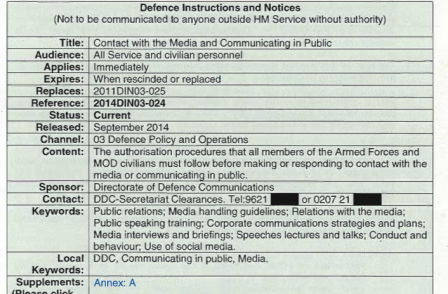
New official guidelines impose strict controls on anyone from the armed forces making contact with journalists, even in a social setting.
The rules state that when a member of the armed forces has any contact with a journalist they must immediately notify press officers.
This applies even if a member of armed forces staff meets a journalist socially, or through their family.
The rules don’t just apply to journalists, they also apply if a soldier should accidently come into contact with any individuals who are known to have close links with the media – such as “academics, representatives of industry and think-tanks”.
The new guidelines came into force this month amid revelations that the police have secretly used the Regulation of Investigatory Powers to obtain details of journalists’ phone records in order to find their sources.
Many police forces have also imposed strict controls on contact with journalists in the wake of the 2012 Leveson Inquiry.
The official guidelines apply to all members of the armed forces and MoD civilians.
The rules state: “All contact with the media or communication in public by members of the Armed Forces and MoD civilians on defence topics must be authorised in advance.”
During the Afghanistan war the media played a role in highlighting shortcomings in the equipment used by British soldiers, often relying on information from soldiers on the frontline. The new guidelines would appear to outlaw such contact.
Where unplanned contact is made between a member of the armed forces and a journalist they are instructed to “immediately…notify media staff and provide a written account of the contact”.
The document also states: “These rules still apply if individuals encounter: journalists or other members of the news media in a social setting (whether work-related or not); third party individuals with known links to the media, such as commentators, academics, representatives of industry, think-tanks or lobby groups, or former serving personnel with a media profile.”
The rules also state that any member of the armed forces wishing to communicate on social media on a “non-contentious” defence issue must apply for authorisation to do so.
Failure to comply with the new rules will lead to disciplinary action.
The new rules also apply to cadets and civilian volunteers.

Email pged@pressgazette.co.uk to point out mistakes, provide story tips or send in a letter for publication on our "Letters Page" blog
